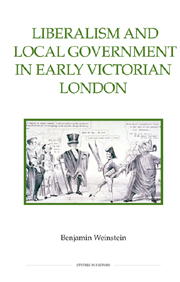Book contents
- Frontmatter
- Contents
- Acknowledgements
- Abbreviations
- Introduction
- 1 Liberal attachments to the unreformed metropolis
- 2 The ‘radicalisation’ of metropolitan political culture, 1832–1841
- 3 The polarisation of metropolitan political culture, 1842–1855
- 4 Redefining the state, I: Rates and taxes, 1834–1853
- 5 Redefining the state, II: The London government problem
- 6 Marylebone in 1854: from conflict to compromise
- Conclusion
- Bibliography
- Index
5 - Redefining the state, II: The London government problem
Published online by Cambridge University Press: 12 September 2012
- Frontmatter
- Contents
- Acknowledgements
- Abbreviations
- Introduction
- 1 Liberal attachments to the unreformed metropolis
- 2 The ‘radicalisation’ of metropolitan political culture, 1832–1841
- 3 The polarisation of metropolitan political culture, 1842–1855
- 4 Redefining the state, I: Rates and taxes, 1834–1853
- 5 Redefining the state, II: The London government problem
- 6 Marylebone in 1854: from conflict to compromise
- Conclusion
- Bibliography
- Index
Summary
1834 was a decisive year in the deterioration of Whiggery's relationship to the metropolitan radical movement. In addition to being the year of maturation for London's Hobhouse vestries, 1834 played host to the heated debates on church rate and poor law reform which initiated a polarisation between vestry-based libertarians and Whig centralisers. From 1835 this was crystallised by debates on the reform of municipal government. London's omission from the Municipal Corporations Act lent further force to the metropolitan radical critique of Whiggery as the party of centralisation while simultaneously undermining such a critique in the provinces. The same was true of succeeding local government legislation. Whereas provincial opposition to the 1848 Public Health Act, for instance, revived the language of ‘Whig centralisation’ in places such as Leeds and Birmingham, the measure was none the less aimed at giving existing provincial municipal corporations more fully developed sanitary powers, and in fact the act's author, Lord Morpeth, maintained that the 1848 bill could be called a measure ‘for consolidating, strengthening, and making more effectual the functions of local bodies in the various municipal towns of England and Wales’. Russell agreed, and claimed that ‘the essential object of the bill … is giving local bodies the power of making sanitary laws’. London, to which the Public Health Act did not apply, faced an altogether different level of central intrusion. From 1847 the implementation of Chadwick's ‘London Programme’ meant that the metropolitan sewers would be administered by a commission almost wholly appointed by central government.
- Type
- Chapter
- Information
- Liberalism and Local Government in Early Victorian London , pp. 116 - 144Publisher: Boydell & BrewerPrint publication year: 2011



